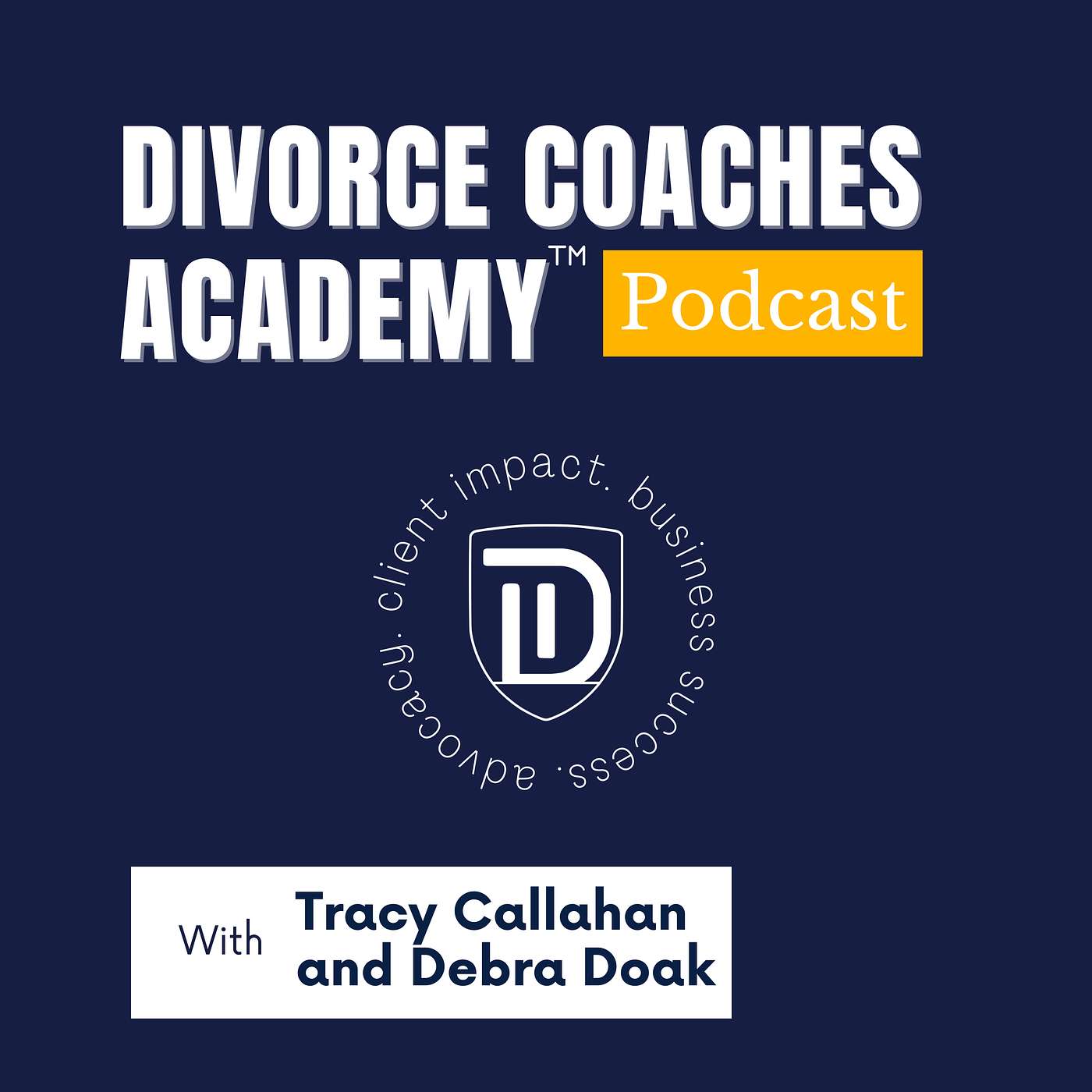Divorce Coaches Academy
Escalation Loops in Conflict: Understanding and Interrupting the Cycle in Divorce
Feb 25, 2026
Season 1
Episode 199
Tracy Callahan and Debra Doak
Send Us a Message (include your contact info if you'd like a reply)
We break down escalation loops in co‑parenting, why they entrench, and how divorce coaches can interrupt them with practical, evidence‑informed tools. We share the pause protocol, BIF writing, nervous‑system resets, and real‑time awareness checks that end reactive volleys and protect the long game.
• definition of escalation loops and why they persist in divorce
• reactive communication and negative reciprocity mechanics
• amygdala hijack and dysregulation as baseline conditions
• pattern entrenchment and confirmation bias reinforcing the story
• the pause protocol as an active strategy
• choosing structured channels and using BIF for concise replies
• loop awareness questions to stop mid‑exchange
• regulate first, respond second using body‑based tools
• reframing the real goal from winning arguments to stable co‑parenting
• the coach’s role as steady, strategic partner
If today’s episode was useful to you, please share it with a colleague, leave a review wherever you listen to your podcast, or come find me at the DCA community. And if you would like to learn more about the training we provide to support the professional practice of divorce coaches, please check us out at divorcecoachesacademy.com
Learn more about DCA® or any of the classes or events mentioned in this episode at the links below:
Website: www.divorcecoachesacademy.com
Instagram: @divorcecoachesacademy
LinkedIn: divorce-coaches-academy
Email: DCA@divorcecoachesacademy.com
 Escalation Loops in Conflict: Understanding and Interrupting the Cycle in Divorce
26:22
Escalation Loops in Conflict: Understanding and Interrupting the Cycle in Divorce
26:22
 The Myth of Love as a Conflict Solution
18:20
The Myth of Love as a Conflict Solution
18:20
 When Personal Story Becomes Product: Professional Risk, Market Confusion, and the Future of Divorce Coaching
20:44
When Personal Story Becomes Product: Professional Risk, Market Confusion, and the Future of Divorce Coaching
20:44
 Why Divorce Coaching Needs Clear Standards Of Practice
26:39
Why Divorce Coaching Needs Clear Standards Of Practice
26:39
 What Attorneys Wish Clients Understood About Fairness
33:55
What Attorneys Wish Clients Understood About Fairness
33:55
 Reframing Fairness Without Invalidating Emotion
32:34
Reframing Fairness Without Invalidating Emotion
32:34
 Fairness Vs. Resolution Within the ADR Framework
24:20
Fairness Vs. Resolution Within the ADR Framework
24:20
 Fair is the Four Letter Word: Why Chasing Fairness Keeps People Stuck in Divorce
21:23
Fair is the Four Letter Word: Why Chasing Fairness Keeps People Stuck in Divorce
21:23
 Diversity in Divorce Coaching: A Reflection on Access, Trust, and Effectiveness
31:57
Diversity in Divorce Coaching: A Reflection on Access, Trust, and Effectiveness
31:57
 Artificial Intelligence and Divorce Coaching: Will AI Take Our Jobs or Help Us Do Them Better?
25:29
Artificial Intelligence and Divorce Coaching: Will AI Take Our Jobs or Help Us Do Them Better?
25:29
 The Most Dangerous Sentence in Divorce
23:21
The Most Dangerous Sentence in Divorce
23:21
 Roadmap To A Sustainable ADR Divorce Coaching Practice
36:22
Roadmap To A Sustainable ADR Divorce Coaching Practice
36:22
 Reframing Conflict in Divorce Coaching: From Pathology to Pragmatism
18:59
Reframing Conflict in Divorce Coaching: From Pathology to Pragmatism
18:59
 Preparing for Divorce Month: Coaching for an Exit Strategy
40:20
Preparing for Divorce Month: Coaching for an Exit Strategy
40:20
 When Men Divorce: Exploring the Male Experience in Divorce Coaching
37:03
When Men Divorce: Exploring the Male Experience in Divorce Coaching
37:03
 Navigating Divorce When Family Advice Clashes With Resolution
30:39
Navigating Divorce When Family Advice Clashes With Resolution
30:39
 How Thoughtful Parenting Plans Reduce Conflict And Protect Kids
39:30
How Thoughtful Parenting Plans Reduce Conflict And Protect Kids
39:30
 Defining Divorce Coaching: Role, Boundaries, and Impact
25:08
Defining Divorce Coaching: Role, Boundaries, and Impact
25:08
 The Power of Mentorship: Guiding Growth in the Divorce Coaching Journey
24:34
The Power of Mentorship: Guiding Growth in the Divorce Coaching Journey
24:34
 Breaking the Cycle: How Confirmation Bias Keeps Divorcing Couples Trapped in Conflict
35:28
Breaking the Cycle: How Confirmation Bias Keeps Divorcing Couples Trapped in Conflict
35:28
 Inside New Zealand’s FDR Shake-Up: Free Mediation, Fewer Supports, and the Case for Coaching
34:20
Inside New Zealand’s FDR Shake-Up: Free Mediation, Fewer Supports, and the Case for Coaching
34:20
 Fear-Driven Divorce: Unpacking Client Anxieties
23:12
Fear-Driven Divorce: Unpacking Client Anxieties
23:12
 Brick by Brick: Divorce Lessons from the Three Little Pigs
17:59
Brick by Brick: Divorce Lessons from the Three Little Pigs
17:59
 Waiting for Sorry: Moving Beyond Apologies in Divorce
20:40
Waiting for Sorry: Moving Beyond Apologies in Divorce
20:40
 When Drinking Concerns Meet Custody: The Soberlink Solution
32:41
When Drinking Concerns Meet Custody: The Soberlink Solution
32:41
